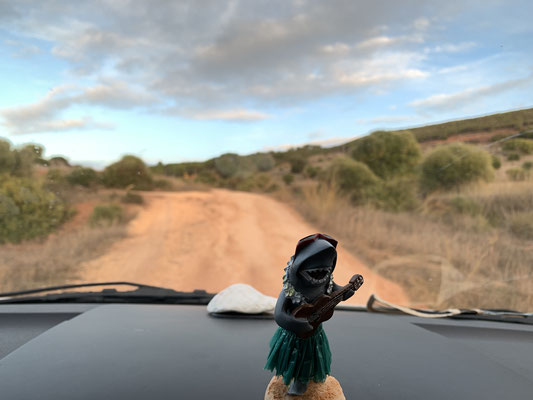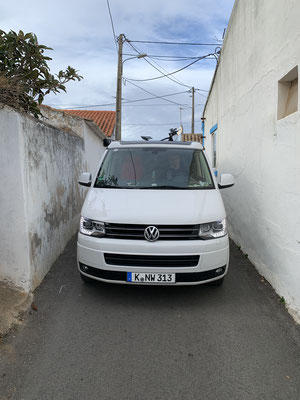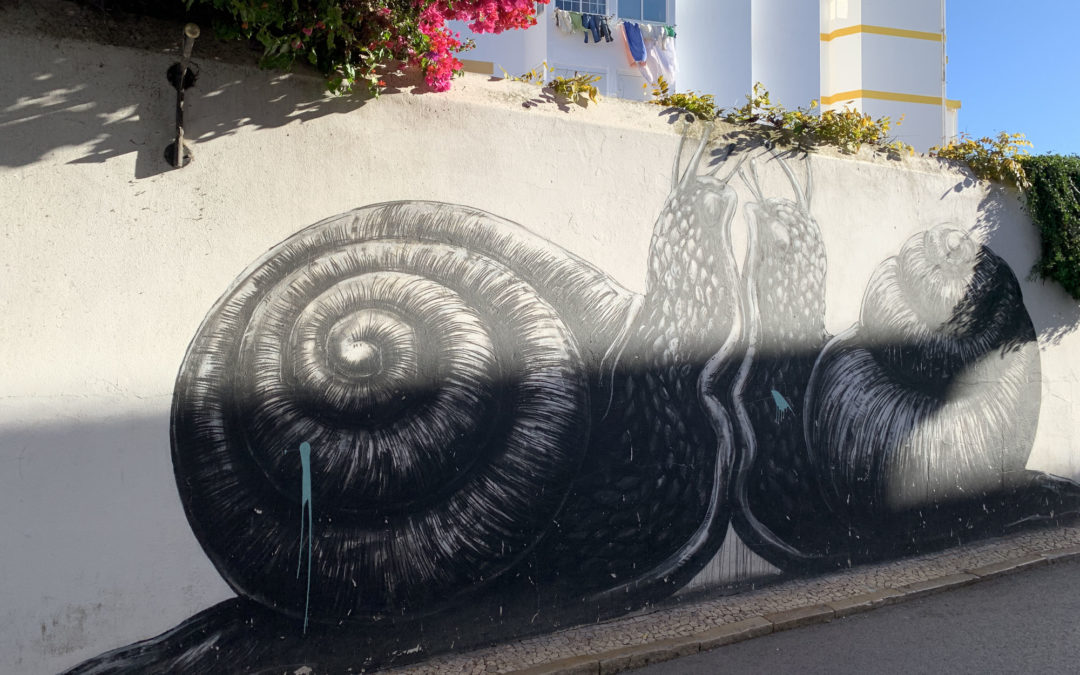„Man kann die Menschen in drei Klassen einteilen: Solche, die sich zu Tode arbeiten, solche, die sich zu Tode sorgen, und solche, die sich zu Tode langweilen.“ – Sir Winston Churchill
For many years, we were also among those who almost worked themselves to death. - But both Torgit and I have always had fun and enjoyed our work. - There is nothing worse than having a job and looking forward to the weekend. Nevertheless, we worked a lot, very much, sometimes too much.
The picture of the snails from our street art search in Lagos yesterday, on the other hand, fits quite well with what we have to report today. - We are slowing down a bit at the moment, meaning we are traveling more slowly. While at the beginning we had the feeling to travel like we lived at home, we are currently consciously taking it a bit more relaxed. - Here is a small example: We were exactly one month ago, on day No. 45 in Nazaré - at the Big Wave Surfer Hotspot the waves were not quite so big. This is probably the case at the moment. Two days ago, the French Justine Dupont succeeded in riding one of the highest waves ever conquered by a woman. - We would have liked to have seen that. But to go up there again now is too much stress for us, at least in one tour. - We prefer to take it easy. - But this slowness leads to unexpected consequences.
Bisher gab es immer etwas zu tun. – Doch am heutigen Tag ist es anders: Nach 76 Tagen, sagt Torgit plötzlich, „es ist mir langweilig. – Es ist das erste Mal, dass mir langweilig ist.“ – Ich reagiere sofort, wie es meine Art ist und versuche eine Lösung herbei zu führen. – Was wollen wir dagegen tun, ist meine Frage. – Torgits Antwort verblüfft mich. – Warum sollen wir etwas dagegen tun, eigentlich ist es doch ganz angenehm. Ich lasse das ganze erst einmal sacken, dann hinterfrage ich es. – Torgit und ich stellen gemeinsam fest, dass wir Langeweile eigentlich gar nicht kennen. Und selbst dann, wenn es langweilig zu werden droht, suchen wir uns immer etwas, um uns zu beschäftigen. In der Regel gibt es ja auch immer etwas zu tun. – Komischerweise haben wir ansonsten ein schlechtes Gewissen. – Einfach nichts tun, darf man das? – Ist das überhaupt erlaubt? – Wir tun nur dann einmal nichts, wenn es uns nicht gut geht, wenn wir krank sind. Und selbst dann haben wir ein schlechtes Gewissen, nichts zu tun.
Even when I'm lying in the hammock for a change, I'm doing something. I write in the blog, I read something, I check my mails, I call someone. - But this simply looking into the air is incredibly difficult for me, for us. - How quickly do we make fun of the smartphone generation? - Lazy, self-centered, in love with their smartphone. That's what I hear again and again. - But when do we really engage with ourselves? - Maybe now.
When I look out the window, there are the flamingos again. - They don't seem to have a bad conscience at all, just doing nothing. Torgit and I spend some time analyzing where our guilty conscience comes from. - I claim that she, as a civil servant, should be able to do this perfectly by profession. She cleverly counters that she has always waited tables in addition to her job as a civil servant. - But is there not already again the justification, the bad conscience? - We are not going to clarify the issue conclusively today. But you can sense that we both still need to talk about this.
It seems that there are people who are bored more often. I will probably not get used to it so quickly. - So what is there to do?
Since we have our appointment with Spacecamper on the 28th, we'll start measuring Hector today. If you have nothing to do, then you just look for a new task. In this context it is noticeable that (m)one has to do everything by oneself. - Actually, that would be Torgit's job, as the saying goes, you can't tell an engineer anything. - But this doesn't seem to apply to female engineers, we know women... and sizes, lengths and so on. (Note from Torgit: I don't have to comment on this, do I? )



Now we have been living in a van for months, watching the SpaceCamper videos over and over again, but somehow we still don't have a real feeling for all the dimensions. But we definitely promise ourselves to have to move less back and forth and to become more self-sufficient. - In a moment, I look at our electricity consumption again. It quickly becomes clear that we have to change the location again today. Otherwise, the battery won't play along. - Yesterday I googled a bit about solar bags, but that doesn't help us today. - So we hit the road. - We decide to drive into the mountains. - On the way we look for water. In doing so, we drive through a typical Portuguese road. - Thank God this one doesn't come close to the narrowest road on our tour. - But when suddenly a ninety degree bend comes, we also reach our limits again. But unfortunately again no one comes out of the bus to take a picture of it. Maybe sometime, somewhere. On the way we do a little shopping. Always exciting to explore a new supermarket every four days. Not far from there is our dry cleaner from the day before. - Will we still find Torgit's Flippi? No, it was a Floppi, we just get the confirmation that we really lost him here. But nobody knows where he disappeared to. - But by chance we see two more murals. We hope not to bore you with so much street art.
On the way to the mountains, once again a road is closed. We find an alternative route. - Something like this here always quickly reminds us of off-road tours. In any case, I would sometimes be more comfortable with a four-wheel drive. But Hector muddles through everywhere. In the end we are rewarded once again. Our day ends with a magnificent view of the Odeáxere Dam (Portuguese Barragem de Odeáxere or Barragem da Bravura).



Recent Comments